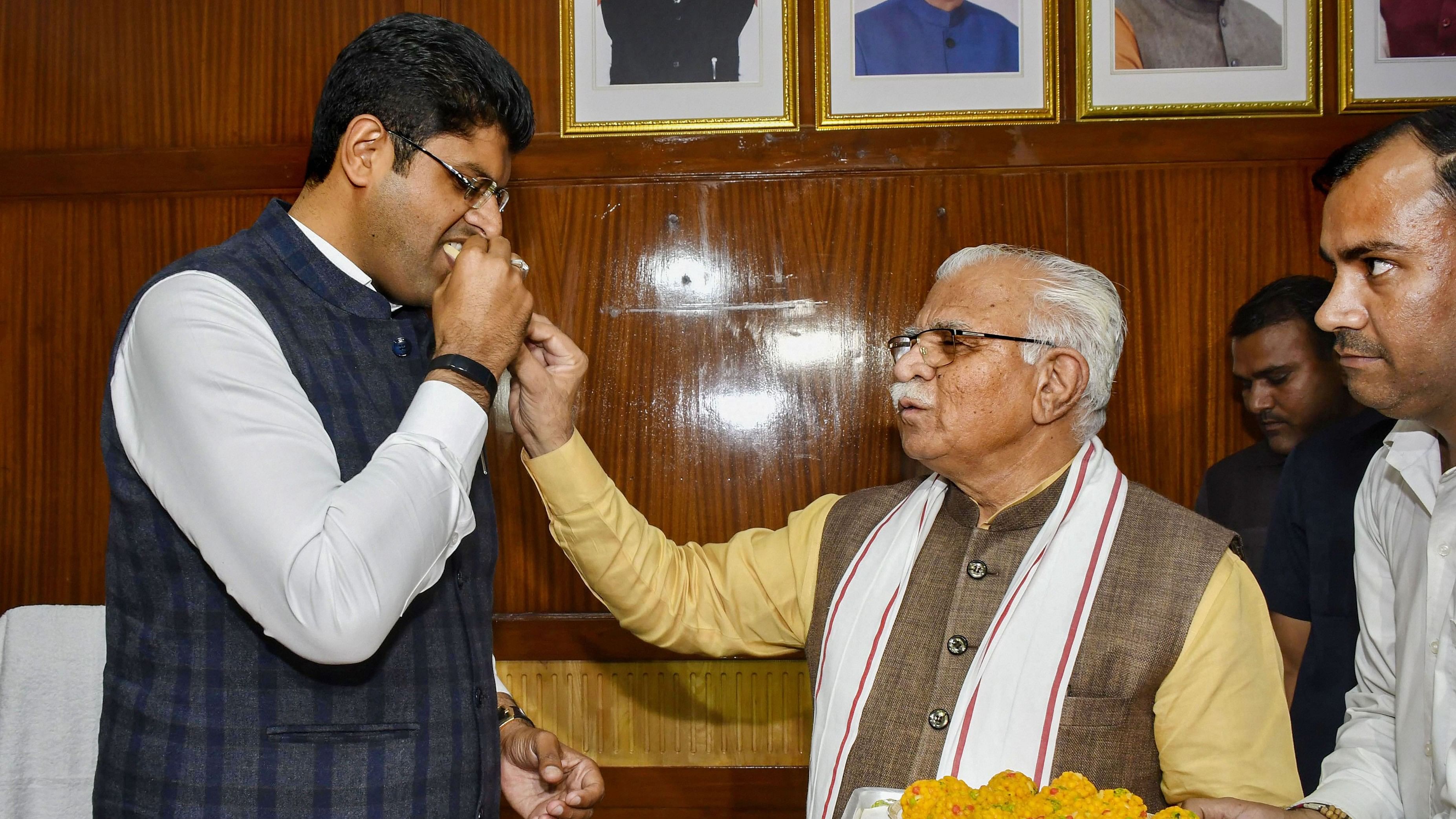
File photo of former Haryana Chief Minister Manohar Lal offering sweets to former Deputy Chief Minister and JJP chief Dushyant Chautala
Credit: PTI File Photo
On October 5, 2024, voters in Haryana will head to the polls to elect representatives for the state's 90-member 15th Legislative Assembly. The counting of votes will take place on October 8.
Haryana, with 2.01 crore registered voters, including 1.06 crore men and 0.95 crore women, has long been home to a multi-party system since its inception in 1966.
The state's political landscape is often characterised by factionalism, dynastic influences, caste-based politics, and frequent defections — famously dubbed 'Aaya Rams-Gaya Rams'.
Over the decades, the number of contesting parties has skyrocketed from 9 in 1977 to 72 in 2019, ensuring that the state has never seen a two-party contest. This multiplicity of players has also given rise to coalition governments time and again.
As Haryana braces for another election season, here’s a look back at the state’s history of coalition governments.
1967: The First Coalition
After the creation of Haryana in November 1966, the first election to the Vidhan Sabha took place in March 1967, with Congress coming to power under Bhagwat Dayal Sharma’s leadership.
However, Congress MLA Birendra Singh defected to form the Vishal Haryana Party, leading to Haryana’s first coalition government with Singh as CM. This government, lacking a clear agenda, collapsed within a year, leading to fresh elections in 1968, where Congress regained power under Bansi Lal.
1977: The Janata Party Landslide
In 1977, the Janata Party, with the support of Jan Sangh, swept the Assembly elections, marking the first time Congress was ousted from power in Haryana. The alliance led by Devi Lal won 82 out of 90 seats, signaling a significant shift in the state's political dynamics.
1987: The BJP-Lok Dal Experiment
The 1987 assembly polls saw a BJP-Lok Dal coalition come to power with 60 and 17 seats, respectively. However, factionalism, especially the tension between Devi Lal and his son Om Prakash Chautala over the CM’s chair, led to the coalition’s premature collapse.
1996: Another Short-Lived Alliance
In 1996, the Bansi Lal-led Haryana Vikas Party (HVP) allied with the BJP to form a coalition government. Despite their victory, internal tensions and instability caused the government to fall before completing its term.
2000: The First Full-Term Coalition
The year 2000 saw the formation of Haryana’s first coalition government that completed a full term. Om Prakash Chautala’s INLD, in alliance with the BJP, came to power, winning 47 and 6 seats, respectively. Chautala's populist promises, including free electricity and water for farmers, helped secure the coalition’s success.
2019: The Latest Coalition Saga
In 2019, a fractured mandate led the BJP to form a post-poll alliance with the Jannayak Janta Party (JJP). The BJP secured 41 seats, JJP 10, Congress 30, and smaller parties and independents shared the rest. However, after four and a half years in power, the BJP replaced Manohar Lal Khattar with Nayab Singh Saini, a member of the OBC community, as Chief Minister, ditching its coalition partner JJP.
Assembly Elections 2024 | In the first assembly polls since the Lok Sabha elections, Narendra Modi and the BJP face a rejuvenated and vindicated Opposition in the Haryana assembly polls. Meanwhile, Jammu and Kashmir is voting after almost a decade and it remains to be seen how the abrogation of Article 370 has impacted the political landscape of the Valley. Track the latest coverage, live news, in-depth opinions, and analyses only on Deccan Herald.